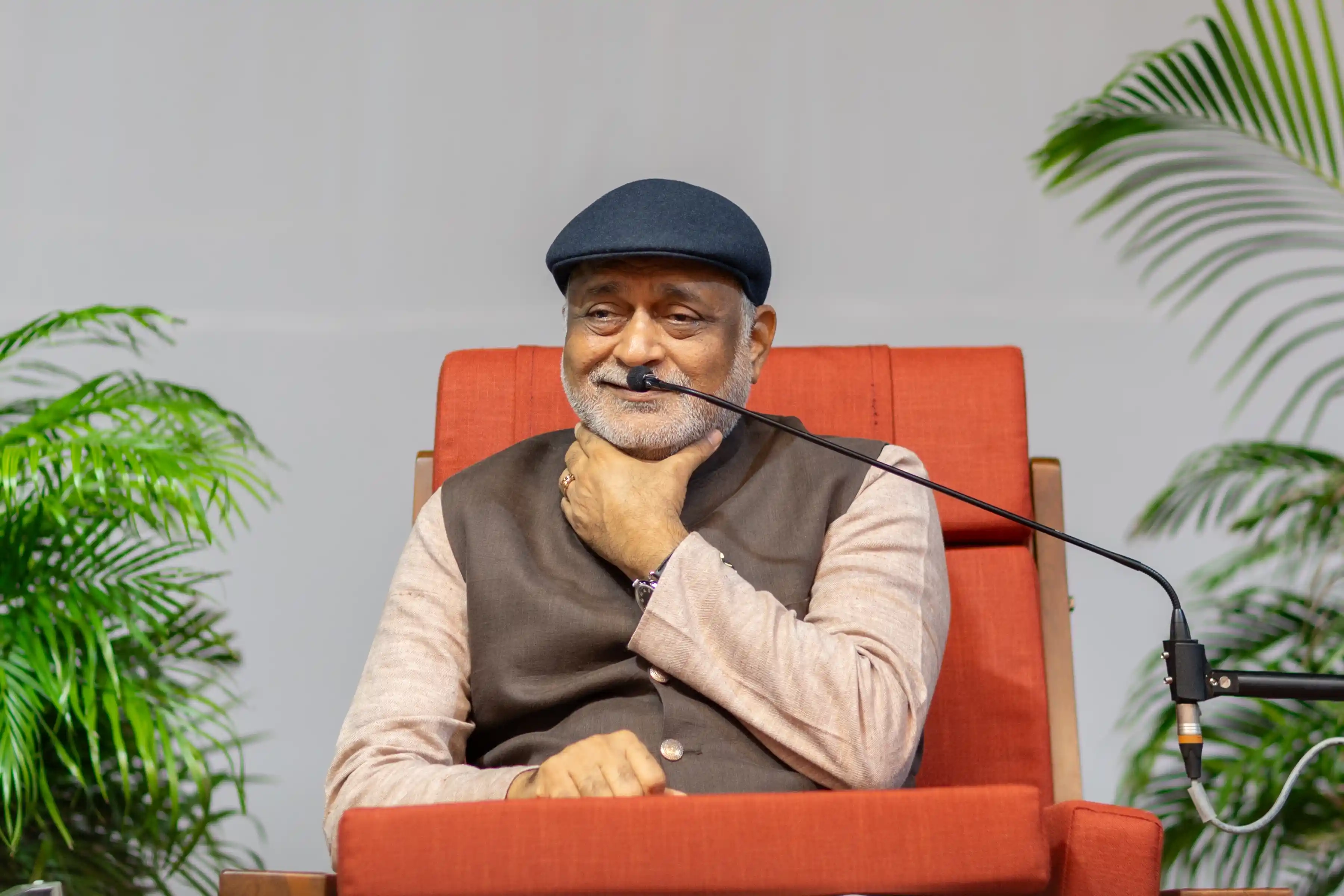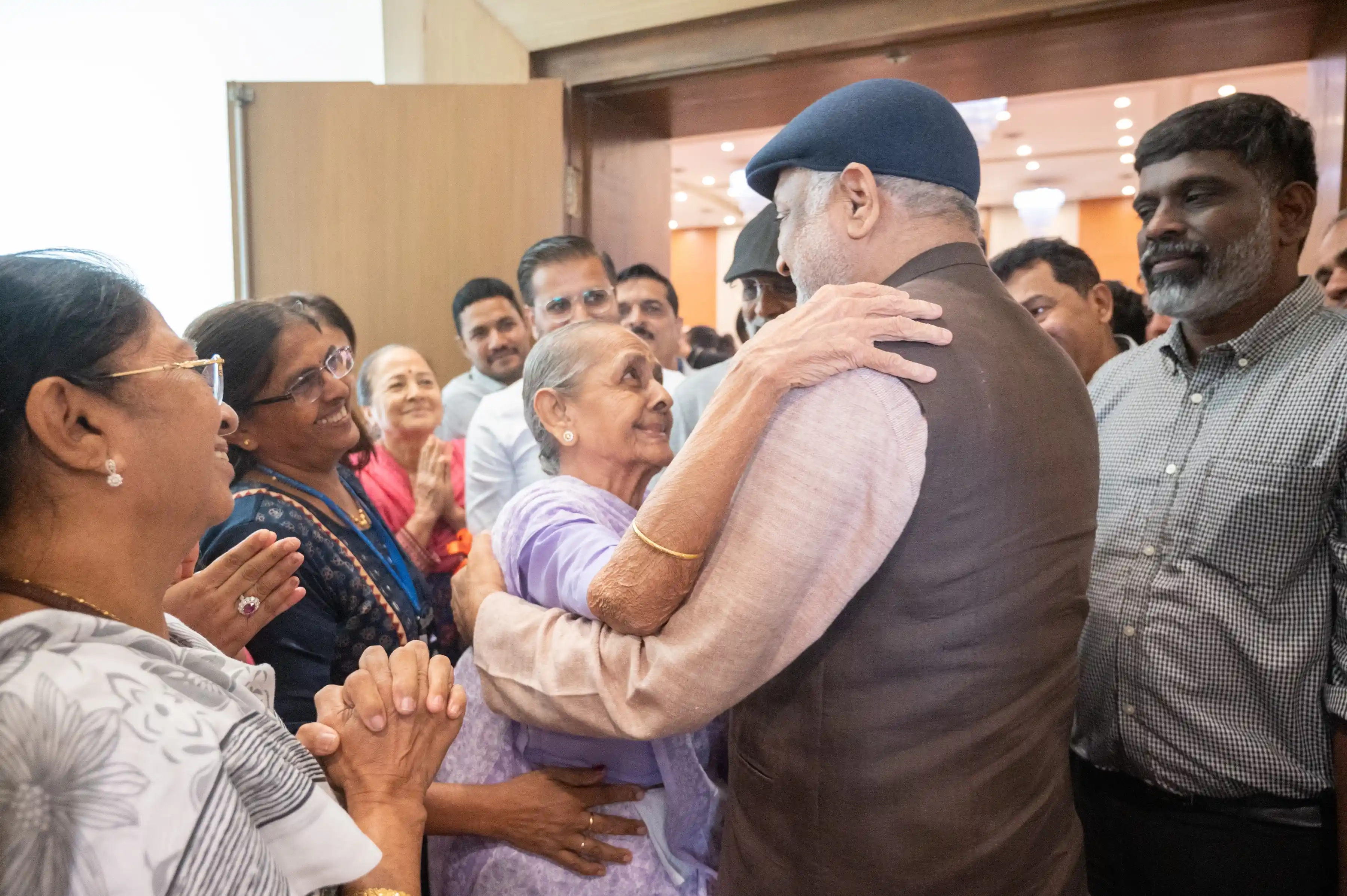A live journal of blessed activities in and around Kanha with Daaji
Simple tips to avoid making mistakes by Daaji
Archive
Last 5 entries
Surat, Gujarat 2nd August to 4th August 2024
Daaji visited Surat, Gujarat, from 2nd August to 4th August, and during his trip, he spent some valuable time at the Auro University, Kisna Nature Park, and many other places. This entry chronicles his time and the pearls of wisdom he shared with the seekers.
Daaji explained, “You know the famous shloka [Sanskrit couplet/verse] they use to praise gurus—gurur brahma, gurur vishnuh, gurur devo maheshvarah, gurur saakshaat parabrahma—do you know what it means? You are saying the guru is like brahma, then in the end you are saying the guru is like parabrahma. Do we know what brahma or parabrahma or maheshvara even mean? You are comparing unknowns. Such shlokas may only be recited when you have arrived at the destination and you are able to see no difference between the Highest and the guru who has taken you to that Highest. Or else—forgive me for my controversial statements—you will be like a parrot reciting without understanding. So, I would like students to raise questions and understand the questions.
2 August
Daaji’s flight from Goa was delayed and he arrived in Surat later than expected. Amid the smiles and warm greetings he received at the airport, Daaji appeared happy and energetic, meeting everyone and exchanging an occasional word or two. It is of interest to note that 42 years ago Daaji had spent many months in Surat to volunteer for the April bhandara [a spiritual gathering] for Revered Babuji Maharaj’s last birthday celebrations in 1982, a topic that came up later in Daaji’s conversations and speeches.
At the airport were also present Shri Savjibhai Dholakia and his family who had been eager to receive Daaji in their hometown. Savjibhai is the recipient of the Padma Shri, India's fourth highest civilian award, for his contributions to the diamond industry and his philanthropic work. Savjibhai drove Daaji to the Surat Marriott Hotel, which, incidentally, happened to be owned by Daaji’s friend from school, Shri Hasmukh P. Rama.
After arriving, Daaji sat down to dinner with Savjibhai, H.P. Rama, and the Heartfulness Coordinators of Gujarat to discuss various matters including his upcoming visit to the Auro University in Surat.
Instilling a Sense of Purpose in Life—Message to the Youth
3 August, Auro University
Daaji was to give a speech at the Auro University later in the morning. The University, founded by H.P. Rama and his family, is based on the philosophical pillars erected by Shri Aurobindo and Mirra Alfass, also known as the Mother. Upon his arrival, Daaji was escorted to a boardroom where the University’s management members met him. After conducting the meditation session, Daaji addressed the audience.
Daaji praised the University for its principles, particularly the practice of faculty internships in continuous education. Building on this idea in the context of spirituality, he emphasized the importance of ongoing self-education without falling into blind faith, remarking that “a little skepticism is needed.”
Daaji explained, “You know the famous shloka [Sanskrit couplet/verse] they use to praise gurus—gurur brahma, gurur vishnuh, gurur devo maheshvarah, gurur saakshaat parabrahma—do you know what it means? You are saying the guru is like brahma, then in the end you are saying the guru is like parabrahma. Do we know what brahma or parabrahma or maheshvara even mean? You are comparing unknowns. Such shlokas may only be recited when you have arrived at the destination and you are able to see no difference between the Highest and the guru who has taken you to that Highest. Or else—forgive me for my controversial statements—you will be like a parrot reciting without understanding. So, I would like students to raise questions and understand the questions.
“Another shloka comes to my mind: tvameva mata cha pita tvameva, tvameva bandhus cha sakhaa tvameva … [You are the mother, you are the father, you are the family, you are the friend, you are the knowledge, you are the wealth, you are everything to me, O Lord of Lords]. They worship the guru like that, but I have seen many devotees who ill-treat their own parents such that even the guru will run away! He will say, ‘You don’t have enough love for your father and you are equating me to him?’ The home is a training ground to learn to love someone unconditionally. If you can’t even love your parents, you can love nobody, not even God.”
Many students then asked Daaji questions on various topics, to which he replied in detail, addressing themes like consciousness, soul, samadhi, and origin of pranahuti [transmission], to name a few, all the while engaging the students in friendly conversation and occasionally counter-questioning their views.


















Surat International Exhibition and Convention Centre
4 August
The event organized by Heartfulness at the SIECC was open to all—practitioners of Heartfulness, new seekers and curious minds. Among the invited guests were two prominent literary figures of Gujarat, Shri Bhagyesh Jha and Shri Vinod Joshi.
The Gujarati translations of 3 books authored by Daaji, The Wisdom Bridge, Spiritual Anatomy and The Yearning of the Heart Vol 1, and the compiled workbook HOPE were released by Daaji, Savjibhai and H.P. Rama. After the book release, the distinguished literary guests were invited to the stage for a discussion with Daaji about his books The Wisdom Bridge and Spiritual Anatomy. The entire session transpired in Daaji’s mother tongue, Gujarati. Here are a couple of translated highlights from the conversation.
- When asked about what inspired Daaji to write Spiritual Anatomy, Daaji said, “Books are often written from thought, imagination or as commentaries on themes that inspire the author. But Spiritual Anatomy is written solely based on experiences. It’s like a map of experiences arising from a simple, but regular and intense meditative practice.”
- What does Brahman [the Ultimate/Absolute] and Atman [soul] really mean? Is Brahman an entity? A spiritual condition? Or God? Split the word into two: bruh means expansion and man here means manan [contemplation]. Split the word Atman into two: at means movement and man here means thinking. Thus, the only difference here is that of the dimensions—Atman is linear, one-dimensional, whereas Brahman is expansion in 360 degrees, it is multi-dimensional. So when we cross the elemental plain [heart regions where the 5 points represent the 5 elements or the panchabhutas] into the cosmic region, we experience the bruh—expansion of the consciousness. This gives rise to the feeling of ‘aham brahmasmi’ [I am Brahman]. And yet, there is still more to experience when we transcend even this feeling.
The discussion further delved into parenting and family life, with Daaji elaborating on the essence of his book, The Wisdom Bridge.
In the evening, Daaji returned to conduct a mediation session after which he answered questions that had been previously collected from the audience. Here are some quotes from his answers.
- No one knows how to make use of the freedom given to us. Often, we use it to do wrong things. Babuji Maharaj said, “You have only one freedom—the freedom to do the right thing.” To do what is wrong, no God can give permission. To do what is right, you don’t need anyone’s permission.
- The fact that you are asking this question ‘how do I know if I am doing meditation correctly or not?’ means you are not doing it correctly. It’s only when we are on the wrong track that Nature gives us an indication that something that you are doing is not right.
- There is no limit to the refinement of our practice.
- It is said that Ravan ascended to Heaven while Duryodhan ended up in Hell, even though both met their end due to the intervention of two divine incarnations—Lord Rama and Lord Krishna respectively. This difference arose because Ravan, in his final moments, paid his respects to Lord Rama as reverence filled his heart for the Lord. In contrast, Duryodhan’s heart remained consumed by hate.
- When Babuji visited Surat in 1982, he made a beautiful statement in Hindi, “Mind your own business—don’t get involved in someone else’s issues.”















